
England and Wales’ national parks date from a law passed 70 years ago. Our writer, who has walked all 13, picks fun breaks and youth hostels in each
by Phoebe Taplin
Peak District
Legal protection of England and Wales’ national parks began with a law passed by the post-war Labour government that also created the NHS. The 1932 mass trespass at Kinder Scout in the Peak District helped bring about the 1949 National Parks Act, and two years later the upland area was designated Britain’s first national park. It embraces five counties, receives 13.25 million visitors a year and is a walker’s Shangri-La. The massive moors and gritstone crags of the northern Dark Peak are impressive, but it’s the White Peak’s limestone dales and wooded gorges that are most appealing for weekending families in spring.
Begin in Bakewell – its famous puddings are even tastier after a day’s adventures – and get your bearings at the visitor centre in its 17th-century Old Market Hall. Then make for Over Haddon, 10 minutes away by car or bus, to explore lovely Lathkill Dale. Footpaths run beside the river, with cascades and deep blue pools populated by little black-and-white short-tailed birds called dippers.
Nearby is stately Chatsworth House (adult £23, child £14.50), open for February half-term and then fully open from 23 March, when there will be banks of yellow daffodils around the lake. There’s a Little Explorers trail to follow around its 105 acres.
Drive on another half-hour to the village of Castleton, with its ruined 11th-century Peveril Castle and its caves. Take an underground boat ride through Speedwell Cavern (adult £12, 5-15s £10), a centuries-old lead mine with a subterranean lake known as the Bottomless Pit. A joint ticket with nearby Peak Cavern lets you into a cave called the Devil’s Arse, which should appeal to most children.
Diary date: 16-24 February Chatsworth’s petting farm (£6.50 adult or child) has a piratical theme this half-term, with tricornes and parrots, water blasting and galleon sailing. There are also tractor trailer rides and, for those who dare, the chance to handle snakes and spiders; more sensitive souls might be happier with the lambs, goats and guinea pigs.
Stay Hartington Hall youth hostel (family rooms from £35) is a 17th-century manor with wood panels and open fires, on the edge of pretty Hartington village in the south of the park.
South Downs
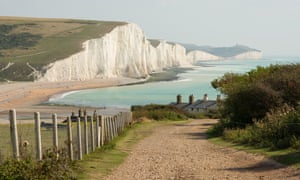
England’s newest national park runs from St Catherine’s Hill in Winchester to the white cliffs of the Seven Sisters near Eastbourne. As well as the 100 miles of the South Downs Way, there are lots of other great walks here. From the car park or bus stop at the site of the ancient village of Exceat, there’s a choice of a 3½-mile walk to the Seven Sisters cliffs, a seven-mile trek to Eastbourne or – the family favourite – a gentle grassy stroll along the meandering river to rockpool-rich Cuckmere Haven.
Kite flyers make for Ditchling Beacon near Brighton. This highest point in East Sussex has a classic 360-degree view, encompassing the wide fields and farms of the weald and the sparkle of the sea. As well as kites, there are likely to be colourful paragliders launching from nearby Devil’s Dyke and floating over the green slopes below. Stroll along South Downs Way to reach the twin Jack and Jill windmills a mile and a half away.
The next day, head west to the retro rides and craft workshops of Amberley Museum (adult £13.60, 5-15s £8, open at half-term then from 6 March). It’s in an old chalk quarry, with a narrow-gauge railway and vintage open top bus providing living transport history, and a historic print shop gives hands-on lessons in communication.
Diary date: 16-24 February
The Sussex Puddle Jumping championships reward the biggest, splashiest jumps, as recorded by Arundel Wetland Centre’s Splashometer (adult £10.88, 4-16s £5.85).
Stay YHA South Downs near Lewes is a converted farmhouse with huge garden and a courtyard cafe (family rooms from £59). Or base yourself in West Sussex at YHA Littlehampton on the revamped Fisherman’s Wharf, handy for the beach and not far from Arundel’s Castle and Wetland Centre (family rooms from £49).
Brecon Beacons
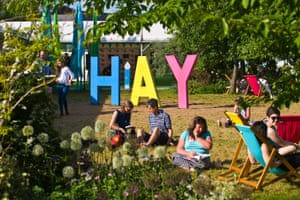
A hilly adventure playground, the heathery Brecon Beacons offer walks and canal trips, waterfalls, caves and a town full of books. Kick off in Brecon itself on the park’s northern edge, picking up picnic supplies in the market and ice-creams from Llanfaes Dairy, just outside town.
Take a boat trip (from March) along the Monmouthshire and Brecon canal with Dragon Fly cruises (adult £7.80, under-16 £4.50), crossing the River Usk on a 19th-century stone aqueduct. For walkers, short Down to the Sea family trails along the canal encourage kids to engage with the area’s industrial history. The first one leads from Brecon to the old waterside limekilns.
Head for the visitor centre at Libanus, 10 minutes away, to get a small taste of the huge landscapes: a 2½-mile waymarked walk takes in the iron age hillfort at Twyn y Gaer, with mountain views. Book ahead for stargazing events at Libanus, where the Milky Way is visible on clear nights; Dark Sky Wales, which runs them, has a blow-up planetarium to guarantee stars even when it’s cloudy.
The Dan-yr-Ogof show caves (adult £15, 3-16s £12, 1 April-3 November) offer half a mile of underground passageways, the monumental Cathedral Cave and a chance to walk behind a waterfall. There are also hundreds of huge model dinosaurs, a Shire Horse Centre and an Iron Age village.
Diary date: 23 May-2 June Book ahead for events at Hay Festival (tickets from £5, some free tickets for students) which brings world-class writers to the edge of the Brecons every May, with lots of activities for kids of all ages.
Stay Brecon Beacons YHA is a converted whitewashed Victorian farmhouse soth-west of Brecon in the heart of the national park, with en suite family rooms (from £45) and fabulous views of Pen y Fan – the Brecons’ highest peak at 886 metres.
Pembrokeshire Coast
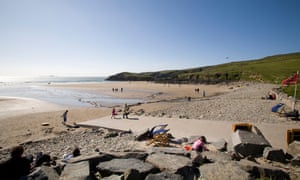
The only dedicated coastal park, surrounded on three sides by sea, Pembrokeshire was named 2018 holiday destination of the year by Countryfile. The rugged cliffs and sandy beaches are generally emptier and the country lanes less choked with holiday traffic than honeypot destinations like Cornwall.
The coast path offers spectacular hikes on headlands fringed with pink thrift. A mile-long taster around Lydstep has views of arches, coves and blowholes along the rocky coast to Skrinkle Haven. The grassy cliffs are full of spring flowers and butterflies; below, 100 steps lead at low tide to the beach, rock pools and Lydstep Caverns.
Next day, drive an hour north-west to Britain’s smallest city – St Davids – and take a boat trip to Ramsey Island (adult £26, 4-16s £14, under 4s £5, from February half-term, weather dependent). Look out for seals, porpoises and guillemots and, later in the year, cute, ungainly puffins.
Over-eights can go coasteering with Celtic Quest (£45): rock hopping, cave crawling and cliff jumping in an action-packed but unpressured half-day. Winter wet suits, buoyancy aids and more are supplied.
Manorbier Castle, a dramatic ruin on the nearby cliffs, opens at the end of March (adults £5.50, child £3, family £15. Well-kept Carew Castle is open all year and has a daily treasure hunt around the grounds (adult £4.50, child £3, family£12.50)
Diary dates: 25 February, 13 March, 15 April The National Trust is running a Big Beach Clean Challenge at Freshwater West on the above dates (litter-pickers provided). There are often great surfers to watch too, (national championships are held here) and Harry Potter fans might recognise the beach from the Deathly Hallows films.
Stay Most Pembrokeshire hostels open in March; for spectacular views and seal-spotting, book well ahead to stay in YHA Poppit Sands (family room from £45) at the northern tip of the national park. With gardens stretching to sandy beaches, you hardly need to go anywhere else (which is handy as the car park is 10 minutes away). To be more in the thick of things, try YHA Manorbier, a former military base also overlooking the sea (family rooms from £35).
Northumberland
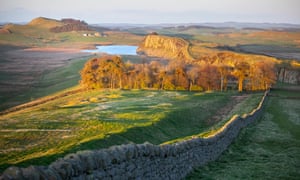
Upland streams, ancient woods, hay meadows and blanket bogs stitch together Northumberland’s patchwork of habitats in England’s most northerly national park. Hadrian’s Wall, a Unesco world heritage site, runs along the southern edge of the park and the Sill Discovery Centre makes a great base for exploring, with interactive exhibition, family astronomy evenings, and a brand new hostel (family rooms from £39) with the turrets and milecastles of Hadrian’s Wall marching across the horizon above you.
It’s an easy one-mile walk from the hostel to the wall’s highest point at blustery Winshield Crags, where kids can pretend to be a Roman soldier or invading Pict, Horrible Histories style. Or follow a four-mile circuit via Sycamore Gap with its iconic lone tree. Head back for local beer and sticky toffee pudding at the Twice Brewed Inn near Bardon Mill.
Nearby Housesteads is Britain’s most complete Roman fort, once home to a regiment of 800 soldiers (adult £7.80, 5-17s £4.70). Children will enjoy dressing up as a legionary, laughing at the communal loos and running around the wide open spaces. The museum has Roman tools, jewellery and weapons, and a winged statue of victory.
Spring is the time for spotting red squirrels, before the trees get too leafy. The lovely three-mile wooded walk to Hareshaw Linn waterfall, crossing six bridges, is a great place to try – and also look out for woodpeckers and warblers among the mossy trees and lichen-covered branches.
Diary date: 16 March Imaginative kids (and their grown-up helpers) will love a morning or afternoon Mythical Beast Making activity (£5pp) at the Sill Discovery Centre. The session starts with a wander through the trees for inspiration before moving on to painting and junk modelling.
Yorkshire Dales

Established in 1954, the Yorkshire Dales national park covers more than 800 beautiful square miles of North Yorkshire, Lancashire and Cumbria. Limestone crags and wooded slopes segue into wildflower meadows, drystone walls and deep valleys.
For an introduction to life here through the centuries, the Dales Countryside Museum (£4.80, under-16s free), in the old railway station at Hawes, charts local history from bronze age spears and Viking jewellery to lead mines and steam trains.
Next, head 20 minutes east to Aysgarth Falls, where the woods are bright with bluebells in April, a series of waterfalls cascade through the valley, and a short, rewarding walk leads to views of 14th-century Bolton Castle.
The next day, head 30 miles south to go underground at Stump Cross Caverns (adult £8.50, 4-13s £4.95) near Pately Bridge. This is a limestone cave system you can walk through at your own pace and a family quiz (with prizes) involves finding fairy doors. Book ahead online for an even more unusual adventure at The Forbidden Corner near Coverham (adult £12.50, 4-15s £10.50, from late March), an oddball labyrinth of tunnels, walkways and secret gardens.
Diary date: 20 February Wrap up warm and meet at Aysgarth Falls national park centre at 5.30pm for a lantern-lit procession through the woods. If you don’t have a lantern, just bring a torch. No need to book (child £3, adult free), and there’s hot chocolate and snacks for kids at the Coppice Café afterwards.
Stay YHA Grinton Lodge (family rooms from £25) is in wild, unspoilt Swaledale, 10 minutes’ walk from Grinton village with its friendly riverside Bridge Inn. (The Tan Hill, England’s highest pub, which also has rooms, is at the far end of the valley.) The hostel is a castellated former hunting lodge with a fire in the lounge and heated log cabins in the grounds.
New Forest
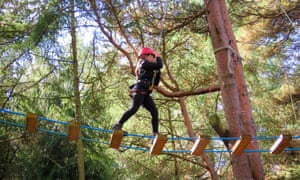
With its heaths and bogs, fields, farms and coast, the New Forest is a rich tapestry of habitats. Look out for bats and butterflies, deer and donkeys, and all six of the UK’s native snakes and lizards. There are no mountains here, though, so its excellent terrain for cycling. Hire bikes all year round from Cycle Experience (from £18.50 a day) by Brockenhurst station and head for the woods or seaside. For little legs, choose a simple trail through Blackwater arboretum, three miles away.
A short drive (or 10-mile bike ride) away is the village of Beaulieu, with cows and ponies wandering the lanes and grazing by Hatchet pond. The Beaulieu Estate (adult from £19.50, 5-16s £9.50) has the National Motor Museum(1920s Sunbeams, record-breaking Bluebird Proteus and so on), stately home, ruined abbey, monorail rides and more.
A new two-mile path runs from Beaulieu through riverside woods to Buckler’s Hard, where Nelson’s warships were built. This village, with its waterside pub and picnic spots, also has a year-round maritime museum(adult from £6.90, 5-16s £5.20).
Across the river, Exbury Gardens (adult from £12.50, child £4) is 100 years old this year and opens from 23 March. Kids can play hide and seek in a jungle of rhododendrons, watch the giant carp in the maple-lined pond, and ride a miniature railway (£5 extra).
Diary date: 21 April Families with kids over eight can pack a picnic (plus marshmallows for toasting) and brush up their bushcraft among the bracken and pine trees on a Woodland Adventure Day (adult £60, under-16s £25) on the Beaulieu Estate. Participants light a fire, build a den, shoot a bow and explore high rope challenges.
Stay YHA New Forest (family rooms from £39) at Burley is a converted country house with bluebells in the garden and heated camping pods for four, as well as family rooms.
Lake District

England’s largest national park covers more than 900 square miles, with no fewer than 16 lakes and attracts huge numbers of visitors. To escape the crowds, begin in the village of Glenridding by Ullswater. Catch a steameracross the lake to Aira Force waterfall, with its tree trail, then walk back along a three-mile stretch of the Ullswater Way, through the woods where William Wordsworth’s host of golden daffodils still dance each spring.
Then drive south to the wide waters of Windermere and call at Brockhole, the Lake District’s official visitor centre, where (for free) the kids can scramble under nets, race through tunnels and zip down wires. There are rowing boats or kayaks to rent (from £15 an hour) for a Swallows and Amazons adventure among the wooded islands. You can rent bikes here too and take them on Bowness ferry to Windermere’s quieter western shore.
Next day, take the 555 bus to Keswick on one of Britain’s most beautiful routes, running for an hour by the shores of Windermere, Rydal Water, Grasmere and dreamy Thirlmere. Don’t miss homemade gelato at Casa Bellain Keswick, with 28 flavours from strawberry to honeycomb.
And a new attraction, the Windermere Jetty Museum of Boats, Steam and Stories, opens on 23 March. The £20m development will house a collection of 40 vessels and other exhibits, telling the story of boat building in the Lakes.
Stay The Lake District has some great youth hostels, though they do get booked up quickly. YHA Keswick has clean, bright family rooms (from £39), with the River Greta murmuring below their balconies.
Diary dates: 11 and 19 April Beatrix Potter is big business in the Lakes and the World of Beatrix Potter in Bowness (adult £7.95, child £3.95) holds regular Old Brown Owl Days, with live owls. There are also storytelling sessions, crafts and Peter Rabbit tea parties.
North York Moors
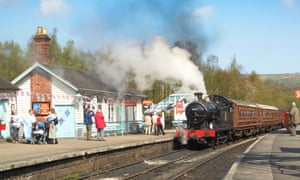
This huge, wild expanse of heather-covered moorland and windswept coast feels ancient and exhilarating. From magical steam train rides to starry night skies, there’s plenty for families to do. Scenes at Hogsmeade Station in the Harry Potter movies were filmed at Victorian Goathland station, on the North Yorkshire Moors steam railway (open February half-term, then from late March). Returns from Goathland to Grosmont cost £13 adult, £6.50 4-16s – less if you walk back along the river (allow two hours) with its woods and waterfalls. You don’t have to be Potterites to ride – you can enjoy the Yorkshire scenery and learn about science at Peter’s Railway Young Engineer’s Centre.
Keep up the time-travel theme at Ryedale Folk Museum (adult £8.25, 4-15s £7.25, open daily from 23 February) with its iron age round house, thatched cottages, and working forge.
On a sunny day, climb conical Roseberry Topping for fine views, stopping on the way back at the Woolly Sheep cafe in the national park centre in Danby, with adventure playgrounds and a riverside sculpture trail.
On a rainy day, hop on a Coastliner bus – the route between Whitby and York was recently voted Britain’s most scenic bus route. For the best moorland scenery, ride to pretty Thornton-le-Dale and back.
Diary date: 15 February-3 March The North York Moors (along with the Dales, South Downs and Northumberland national parks) is taking part in the annual Dark Skies Festival, celebrating the best starry vistas in England with a programme of night walks, bike rides and other experiences. On 28 February there’s a stargazing event (adult £12, under-16s £8, 7-9pm) at Sutton Bank, an hour’s scenic sunset drive from Whitby, with a big telescope for viewing distant galaxies and star clusters, and a planetarium too.
Stay The famous YHA in Whitby (family rooms from £39) is in a 16th-century mansion built of golden stone, next door to the ruined abbey (which guests can visit for free). It overlooks Whitby harbour and the view that inspired Bram Stoker’s Dracula.
Snowdonia
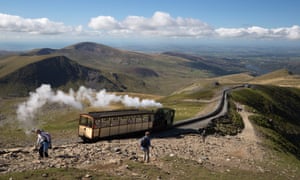
Snowdon, Wales’s highest mountain, is the central landmark in the first national park to open in Wales (established 1951). There are six walking routes to the summit, or take the less strenuous mountain railway from Llanberis. It opens mid-March and runs to Clogwyn, three-quarters of the way up (adult £17 return, 3-15s £11).
Colourful Portmeirion (adult £8, 5-15s free) close to Porthmadog – reached on the narrow-gauge Welsh Highland Line from mid-February – is a jumble of eccentric buildings in pink, turquoise and ochre with a distinctly Mediterranean feel, and subtropical gardens. The many steps mean it’s not pushchair-friendly, but older kids will love running down to the beach at the bottom and getting lost in the woods.
Even short walks on the Welsh coast are rewarding. South of Harlech, try a one-mile stretch from Pen-sarn station by the Artro river to Llandanwg, where the church of St Tanwg sits among the marram grass and wildflowers of the dunes. Nearby, a new floating bridge leads to the grey sandstone Harlech Castle (family ticket £20), with towers on a crag above the sea.
Then drive or take the train to sandy Barmouth and hire bikes from Birmingham Garage on Church Street. Cycle over the breathtaking Barmouth Bridge, a 152-year-old wooden viaduct that spans the estuary, and follow the level Mawddach Trail towards Dolgellau.
Diary date: until 31 March The Centre for Alternative Technology, near Machynlleth on the edge of the park, is waiving its entry fees this winter. Kids can get quite a lot out of the interactive displays about renewable energy, organic gardening and suchlike, as well as enjoying the new quarry trails, play areas and open spaces.
Stay Pen-y-Pass hostel (family rooms from £45) is at the foot of Snowdon and has just had a million-pound refurb.
Exmoor
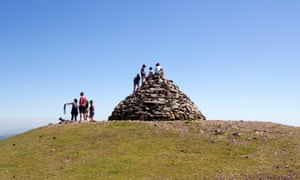
This national park’s combination of coast and rugged moorland has plenty to keep families busy. Start with a ride on the cliff railway at Lynton, a water-powered funicular climbing through a steep gorge to the clifftop (adult £3.90 return, 4-13s £2.40). Then stroll a mile along the coast path to the spectacular Valley of the Rocks, with its castle-like cliffs.
Lunch at the harbourside Bottom Ship Inn in pretty Porlock Weir and try crabbing off the pier with bait bought from seaside shops. Other possibilities include sea kayaking (thick wetsuits and other gear provided, £40pp) or tree climbing, archery and axe throwing on a half-day family activity session with Exmoor Adventures (from £125 for up to five people).
Next day, climb Exmoor’s highest point, Dunkery Beacon. A clear grassy track leads from the car park to panoramic summits half a mile away; Exmoor ponies roam the heather, buzzards wheel overhead and bronze age barrows crown the ancient sandstone slopes.
On selected Sundays in March and April there are new lambs to meet at free Lambing talks held by the National Trust’s Horner Farm. Then explore the ancient trees of the surrounding Holnicote Estate (free but parking charge) looking out for reintroduced water voles. From April, the whitewashed heritage centre in Dulverton has, alongside its working model railway, a new exhibition to celebrate 150 years of Richard Blackmore’s evocative Exmoor-based novel Lorna Doone (free).
Diary date: 17 April Haddon Hill Big Adventure is a day of bug-hunting, den-building, campfire-cooking for families among the big views and open skies of Haddon Hill in the south-west of the park (free, no booking needed).
Stay YHA Minehead, a mile from medieval Dunster with its dramatic ruined castle, has en suite family rooms from £35. Riverside Exford Hostel, right in the middle of the national park, has private family rooms from £76.
Dartmoor
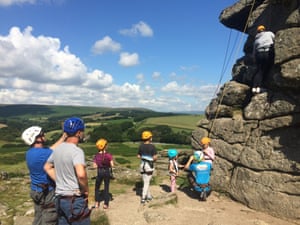
Arthur Conan Doyle enjoyed Dartmoor’s prehistoric sites and wild moorland, inspiration for The Hound of the Baskervilles, published from 1901. He stayed in Princetown, now the Dartmoor visitor centre, which has Victorian clothes to dress up in. The park is perfect terrain for geocaching andletterboxing, which originated on Dartmoor.
Half an hour’s drive away, NT-owned Lydford Gorge (family from £25) has an adventurous fern-fringed walk to the 30-metre Whitelady Waterfall and mossy Devil’s Cauldron. Look out for yellow-bellied grey wagtails near the water. Kid-friendly Cholwell Riding Stables in the village of Mary Tavy offers rides on the moors for those who prefer horseback to feet (from £23 an hour). For more animal magic, Pennywell Farm (£15/£13) across the moors near Buckfastleigh has half-term entertainment plus piglet cuddling, ferret racing and more. The Jolly Roger in nearby Bovey Tracey makes lifesize resin models of everything from Egyptian gods to aliens for theme parks, film producers and ad agencies. Kids are fascinated by its surreal showroom, with haunted house and Disney sections, before heading to Home Farm café on the edge of the moors for a fresh pasty or savoury cheese cream tea. homefarmcafe.co.uk
Diary date: 8-13 April Grapple with the granite on a three-hour rock adventure session (£15pp, all ages) amid Dartmoor’s craggy tors with Princetown-based Crag 2 Mountain. It includes rock climbing, abseiling and “weaselling” though short tunnels.
Stay Stone-built YHA Dartmoor, in the shadow of Bellever Tor, has a woodburning stove and family rooms from £90. It sits amid miles of moorland with wild ponies. There are hostels near Okehampton, too.
The Broads
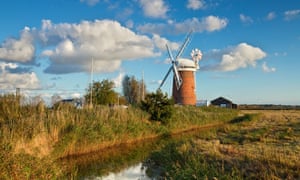
Wide skies over wild marshes and lonely windmills among echoing fens: the Broads, made up largely of waterways, have a particular beauty quite different from other national parks.
Begin at How Hill, near the village of Ludham, with a look round Toad Hole Cottage Museum on the banks of the River Ant to learn how 19th-century marshmen lived. Don’t miss the secret garden and local ice-creams. For a more hands-on activity, take a two-hour family sailing lesson at nearby Hunter’s Yard on a vintage wooden keelboat (£79 for four people).
Next day, drive to Beccles, town of faded Georgian brickwork, with a short trail along the winding River Waveney and over the timeless marshes, where sheep have grazed for two millennia and archaeologists have dug up tall, oak posts that once marked a route for Iron Age walkers.
Ready for more boating? Hire kayaks or two-person Canadian canoes to explore the backwaters (from £17 for a half day at the Waveney River Centre). If it’s raining, Great Yarmouth is half an hour’s drive away and has one of the UK’s largest Sea Life Centres (adult £16.95, 3-13s £14.95), with sharks, a walk-through underwater tunnel, stingrays, starfish, eels. The Wherry Linerailway from Oulton Broad to Norwich train runs by shining waters and waving grass studded with windmills, grazing cows and lazily spinning turbines (adult £8.50, 5-15s £4.25 return).
The Guardian

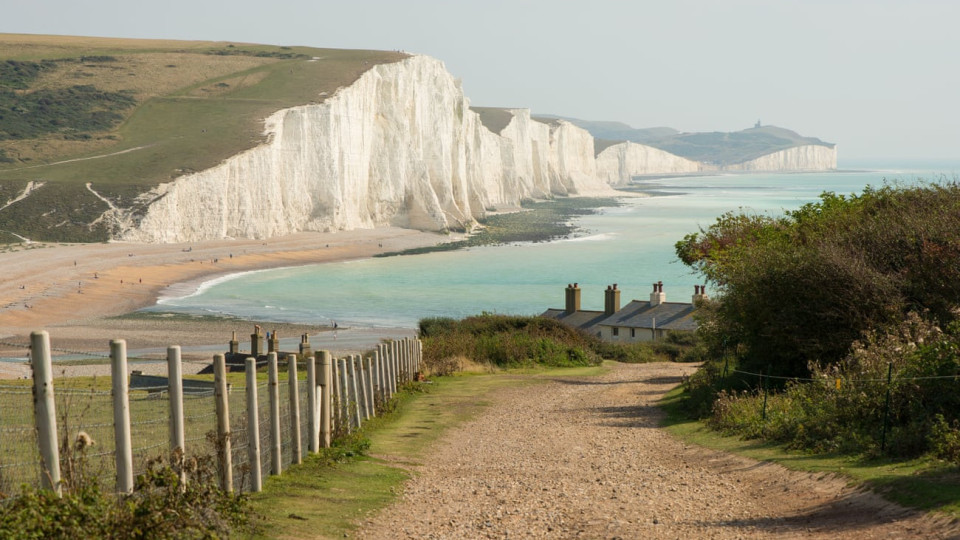









Leave a comment